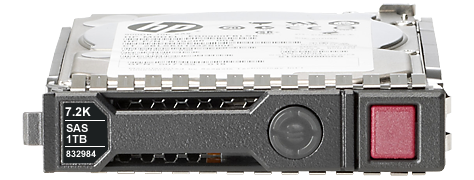Which HDD Is Used for a Server-Class Device?
Server environments demand speed, durability, and nonstop reliability. That’s why most servers use one of these two types of drives:
1. SAS (Serial Attached SCSI) Drives
-
Designed specifically for enterprise and data center use.
-
Offers high-speed performance (10,000–15,000 RPM) and dual-port connectivity for redundancy.
-
Supports continuous 24/7 operation and error correction for mission-critical data.
Ideal for:
-
-
Database servers
-
Virtualization
-
High-performance computing
-
Transaction-heavy workloads
-
Example models:
-
Seagate Exos 10K.7 SAS
-
HPE Enterprise SAS HDDs
-
Dell Ultrastar DC HC330 SAS
2. Enterprise SATA HDDs
-
These are a step below SAS drives but still built for server environments.
-
They offer large capacity (up to 20TB+) and better durability than consumer drives.
-
Perfect for file storage, backups, and archival purposes, where speed isn’t the top priority.
Example models:
-
Western Digital Gold Enterprise HDDs
-
Seagate Exos X Series SATA HDDs
-
Toshiba Enterprise Capacity MG Series
Key Features of a Server HDD
-
24/7 reliability rating (workload rate ≥ 550 TB/year)
-
Vibration resistance for multi-drive setups
-
Advanced error recovery controls
-
Longer MTBF (Mean Time Between Failures)
-
Optimized firmware for RAID configurations
In Short:
For server-class devices, use enterprise-grade SAS or SATA HDDs — built for nonstop performance, reliability, and high workloads.
If you’re setting up or upgrading a system, look for a server HDD that matches your performance needs — SAS for speed, or Enterprise SATA for capacity.
 :
https://www.pinterest.com/directmacroinc/
:
https://www.pinterest.com/directmacroinc/

